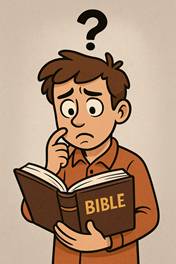Latest Posts
View the latest posts in an easy-to-read list format, with filtering options.
We come now to the most misunderstood and confusing chapters in Zechariah. Most of the confusion is rooted in men’s ignorance of the distinction between Israel and Judah, between the earthly and heavenly Jerusalems, and the two definitions of Judah—men’s definition and God’s definition, as seen in Romans 2:28, 29.

There are multiple points of confusion, making these final chapters difficult to clarify.
Zechariah 12:1 gives us the introduction to the prophecy:
1 The burden of the word of the Lord concerning Israel. Thus declares the Lord who stretches out the heavens, lays the foundation of the earth, and forms the spirit of man within him.
The prophecy is called a “burden,” a heavy load to be carried by the bearer—in this case, the prophet himself. The burden concerns Israel, which, in this case, refers to the united tribes of Israel at the end of the age. Zechariah skips over a huge amount of information showing how the two nations of Israel and Judah were to be reunited at the end.
Much of this supplementary information is supplied in Ezekiel 36 and 37, speaking of the regathering of Israel (Ezekiel 36:24) under “David” (Ezekiel 37:24), the outpouring of the Holy Spirit (Ezekiel 36:27), and the resulting fruitfulness of those people (Ezekiel 36:30). The reunion of Israel and Judah, after the Brotherhood staff was broken long ago, is pictured as a valley of dry bones which come together and then come to life (Ezekiel 37:4-10) as a new man.
Ezekiel 37:16-22 interprets this reunification by putting together the stick of Judah and the stick of Joseph. Zechariah skips over all of these details but assumes that Israel and Judah have been reunited, essentially overcoming the problem of the broken Brotherhood in Zechariah 11:14.
Few people would dispute the validity of this reunification, but most do not understand it, because they tend to think that Judah and Israel were the same nation. In other words, they do not really recognize the significance of the Divided Kingdom, nor do they know that the scepter of Judah was separated from the birthright of Joseph for thousands of years. Reunifying Israel and Judah was necessary to give Jesus Christ both the scepter and the birthright, without which the Kingdom of God could not be established.
Armed with this understanding, we can proceed to the greater revelation of the New Testament, where it is clarified further. Paul tells us who is and who is not a Jew (Romans 2:28 29). While men tend to define a Jew in genealogical terms, God applies the term to those who have received heart circumcision—the mark of a New Covenant believer.
As for the definition of an Israelite, there is no direct discussion of this in the New Testament. Paul speaks of the children of Abraham in terms of those who share his New Covenant faith (Galatians 3:7, 26, 29). The children of Abraham are equated to the sons of God (Galatians 3:26). In addition, we are taught that we are heirs of the birthright (of Joseph) if we are fruitful and manifest the fruit of the Spirit. This too has nothing to do with our genealogy.
When Jesus singled out Nathanael, he said in John 1:47, “Behold, an Israelite indeed, in whom there is no deceit.” Recall that Jacob’s name means deceit, and that his nature was changed when God gave him the name Israel (Genesis 32:28). This did not change Jacob’s genealogy; the name Israel (“God rules”) was a testimony of his new level of understanding about God’s sovereignty.
Hence, men’s definition of Israel may be in terms of genealogy, but God sees it differently. When we develop the mind of Christ, we will conform to His way of thinking by the renewal of our minds (Romans 12:2). Without adopting the mind of Christ and defining words as He does, it would not be possible to have much understanding of prophets such as Ezekiel or Zechariah.
By the same token, when Ezekiel speaks of “David” ruling as the King of reunited Israel, it is not saying that David himself will rule, but rather the One from the House of David—Jesus Christ, the Son of David. By extension, those who “reign with Him” (Revelation 20:6) are not qualified by their genealogy but by siding with Christ in the great messianic dispute. These are the people who are of the House of Judah, being subject to the King of Judah.
This is the background information that is needed to understand Zechariah’s prophecies—and not just his but the prophecies of all the other prophets as well. The failure of the Old Covenant, the divorce and exile of Israel in 721 B.C., and the divorce and exile of Judah in 70 A.D., are all examples of death. But death ultimately is reversed through resurrection. Resurrection, however, brings forth a new creation (2 Corinthians 5:17) that is unlike the original.
In other words, the original Judah, Israel, David, and even Jesus Himself are not resurrected in their original form, as if to re-establish the flesh. Neither will God give life or authority to the Old Covenant that has failed and died. The idea that Christ is going to rule from the earthly Jerusalem in a physical temple on the old site, with Old Covenant animal sacrifices offered by priests from the tribe of Levi is a gross misunderstanding of both the law and the prophets.